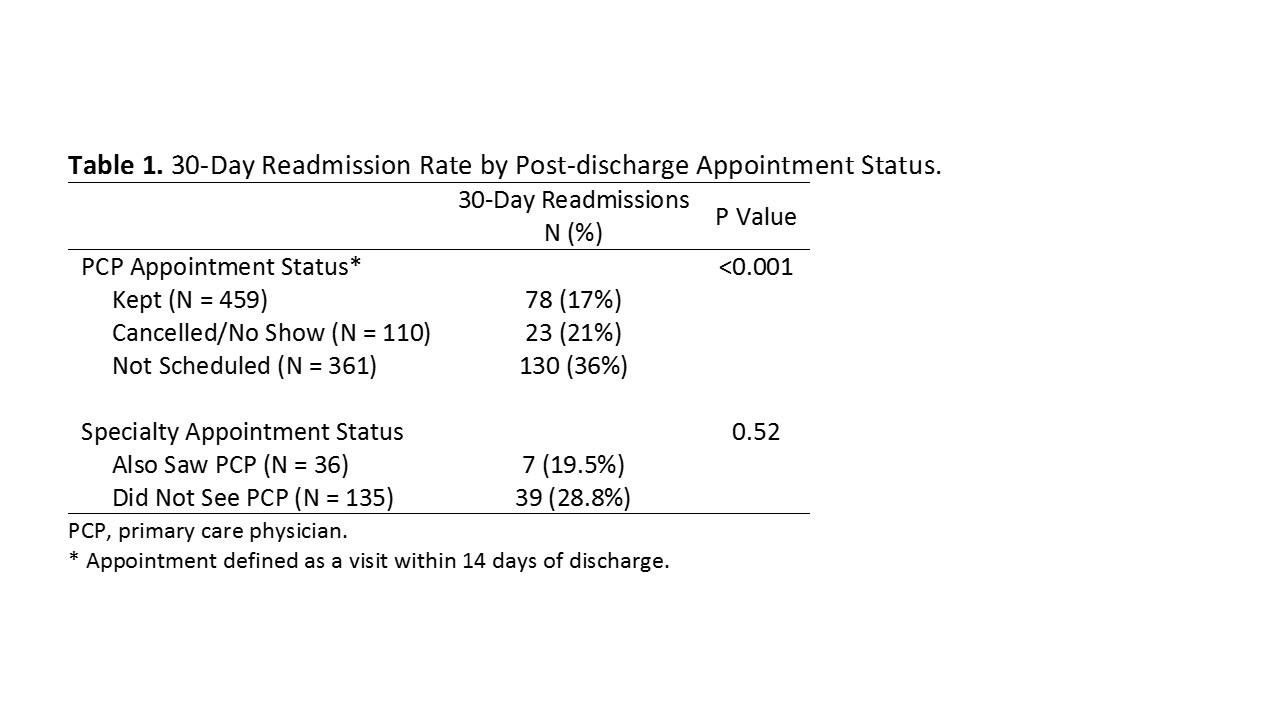Background: The transition in care from hospital to ambulatory setting is a vulnerable period for patients. Nearly 1 in 5 medical patients suffer an adverse event within 3 weeks of discharge and 1 in 2 discharged patients suffer a medication or lab monitoring error (1,2). Such errors contribute to 30-day rehospitalization rate of 19.6% in Medicare fee-for-service patients(3). Previous analyses on whether timely post-discharge visits with a primary care provider (PCP) reduce readmissions have shown mixed results. The primary aim of our project was to investigate the hypothesis that a primary care visit within 14 days of discharge leads to a reduction in 30-day readmission rates.
Methods: We performed a retrospective analysis of all Medicare and Medicare Advantage patients discharged from our hospital from 10/1/2017 – 9/30/2018 who have a PCP at our hospital-based primary care practice. Patients discharged to rehab or a long-term care facility were excluded. Patients were evaluated for having a timely post-discharge primary care appointment, defined as occurring within 14 days of discharge, in accordance with the Medicare Transitional Care Management period. They were further categorized based on our predictor variable of having an appointment scheduled at time of discharge, and then if this appointment was kept or cancelled/missed. The primary outcome was a readmission within 30 days of discharge. We used a chi square test to determine if rates of readmissions were significantly different between groups.
Results: Our study population included a total of 1069 patients. At discharge, 585 patients (55%) had a primary care visit scheduled within 14 days. The 30-day readmission rate for patients with a kept appointment was 17%, compared to 21% for cancelled/missed appointments, and 36% in patients without a scheduled appointment at time of discharge (P<0.001). For patients who saw a specialist but not a PCP within 14 days of discharge, the 30-day readmission rate was 28.8%, versus 19.5% for those who saw both a specialist and a PCP (P=0.52) (Table 1).
Conclusions: A statistically significant reduction in 30-day readmission rates was observed in patients who are seen by a PCP within 14 days of discharge compared to those who do not keep their appointment or do not have an appointment scheduled at discharge. There is a decrease in 30-day readmission rates when patients are seen by a PCP in addition to a specialist that did not reach statistical significance. Our study demonstrates the importance of timely PCP follow up within the 14-day post-discharge period, as well as the benefit to scheduling appointments for patients at the time of discharge to reduce 30-day readmission rates.

